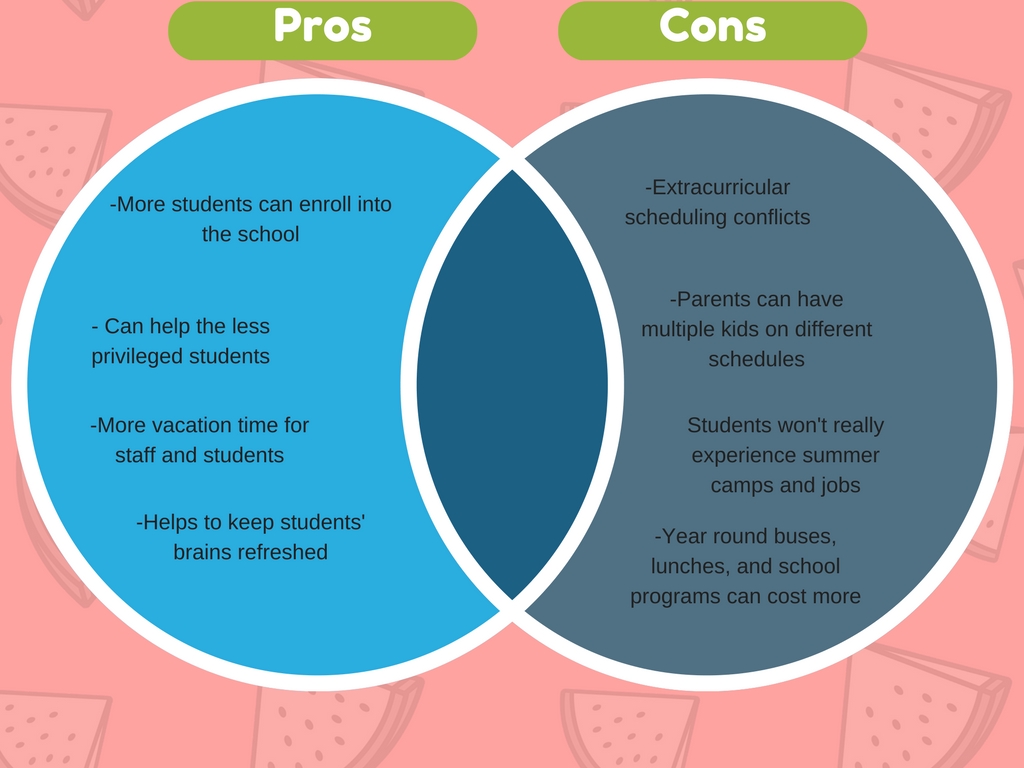Full Year Education: Yes or No?
October 2, 2017
The idea of having kids attend school for 365 days of the year might make some students, parents – and maybe even teachers – shiver with distaste. As a student, I disagree with this concept of year-round education.
According to the database of Year Round School Statistics, there are more than 3,000 schools in the United States that have chosen full-year education. One popular schedule for year-round schools is the 45-15 plan. This is when students have 45 days of school and then 15 days off afterwards.
“If I was single without kids, I would prefer the year-round education schedule because I wouldn’t have to pay for daycare for over three months,” religion teacher Kristina Simes said.
Although some teachers and parents like the idea of year-round education, I disagree. Sure, year-round education would help me to remember important things over the summer, but the schedule would likely interfere with extracurricular activities and events because of the disruptive breaks in between.
Not to mention, there is one main reason schools should stay the same: summer.
Summer is a time of relaxing and spending time with family. Not having a summer off can make it harder to schedule meaningful quality time with family. It is also a long and awaited break that kids, teachers and parents look forward to after a stressful year.
“The constant breaks throughout the year would not allow kids to have free time with their family,” said Rene Perez, a Mater Dei parent. “Kids need time off to relax, not time to overwork their brain.”
Summer vacations can also provide extra learning experiences and adventures that students might not be able to get in a school environment.
And don’t forget about the parents. Parents could love the longer periods of education their kids get, but they could also hate it. Mothers and fathers might dislike having their kids stuck at home during the frequent break – finding babysitters or child care to watch over kids during a full-year education schedule can be a challenge, especially at times when parents are working during the long 15-day breaks throughout the year.
Some students at Mater Dei agree.
“I’d rather have the regular, traditional schedule because having three months off would be more realistic and compatible for my family and I,” freshman Leilani Alvarado said.
Year-round education can absolutely make or break what students learn, how teachers instruct, how parents manage their time and how families spend time together. The traditional school year isn’t broken – why fix it?






![DUNK THE TRASHKETBALL Honors Biology Teacher Kelly Petro clarifies the rules of his interactive science activity. Trashketball, Petro’s newly created game, reinstates crucial science concepts and terminology while allowing students to study recently learned material. Whether in the classroom or on the lacrosse field, Petro ensures that his student-athletes absorb the information using unique study methods. “For school, I try [to have] a general sense of what works for everyone in the classroom [studying wise]. I want everyone to know the [importance of what we are doing in biology],” Petro said.](https://thescarletscroll.com/wp-content/uploads/2025/06/HEIF-Image-1200x800.jpeg)

eek • Mar 26, 2019 at 6:27 am
year round school sucks